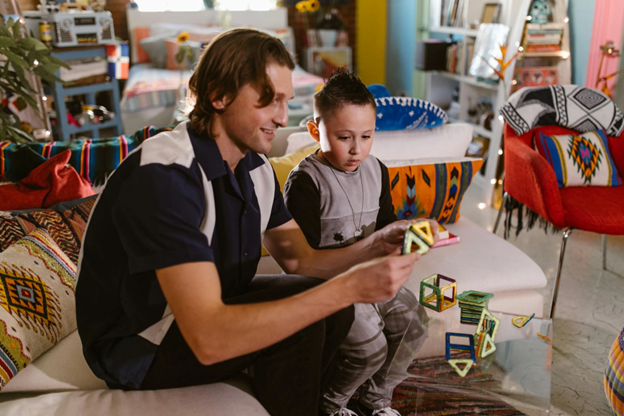Is Homeschooling Right For Your Family? Key Considerations For Parents
Navigating The Challenges And Rewards Of Homeschooling In Diverse Family Dynamics

Deciding whether homeschooling is right for your family is a big decision and shouldn’t be made lightly. Thanks to the pandemic, homeschooling has become more popular than ever before. It’s appealing to many families because of its flexibility, the ability to tailor education to your child’s needs, and the opportunity for a closer family connection.
However, it’s crucial to remember homeschooling is a commitment that impacts not just your child’s education but your entire family dynamic. What works well for one family may not be the best fit for another.
Homeschooling requires careful consideration, including your child’s educational needs, family schedule, and the available support system. For blended families, the decision can become even more complex, especially if ex-partners have differing opinions on how to educate the children. Before diving into homeschooling, weigh all the factors and communicate openly within your family to ensure everyone is on the same page.
What To Think About Before Homeschooling
When thinking about homeschooling, the first thing to assess is your child’s learning style. Some kids thrive in a traditional classroom setting, while others may struggle with the school’s structure, pace, or social environment. Homeschooling can offer more personalized attention and the ability to move at your child’s pace, but it also requires a high level of involvement from you as a parent.
You’ll also consider whether homeschooling fits your family’s schedule and routines. Homeschooling typically requires at least one parent to be home during the day, or you’ll need to figure out a plan for who will be responsible for the teaching.
This might mean adjusting work schedules or making financial sacrifices to accommodate the shift. You may also want to consider whether you’re comfortable taking on the role of teacher or if you plan to use homeschooling co-ops or tutors to help.
It’s also essential to think about your child’s social needs. While homeschooling provides flexibility, your child may have fewer opportunities for social interaction with peers compared to a traditional school setting. Make sure to factor in how you will provide opportunities for your child to build friendships, participate in group activities, and develop critical social skills.
Challenges in Blended Families
Homeschooling can introduce additional challenges for blended families, particularly if you and your spouse are co-parenting with an ex-partner. Even if you and your current spouse are fully aligned in wanting to homeschool, there may be legal or logistical obstacles if your ex objects. Co-parenting arrangements, including legal custody agreements, often dictate who has a say in major decisions like education.
If your ex has joint legal custody, they likely have an equal say in whether or not to homeschool. This can lead to tension if one parent is enthusiastic about homeschooling while the other prefers a traditional school setting. In this situation, communication is vital.
You may need to candidly talk with your ex to explain why you believe homeschooling would benefit your child and be prepared to listen to their concerns. It can help to bring in research or examples of successful homeschooling experiences, especially if your ex has misconceptions about the process.
If you and your ex cannot agree, the next step may involve seeking mediation or legal advice. Some families find themselves in court when they cannot resolve this conflict independently. Courts will typically make decisions based on what they believe to be in the child’s best interest, so it’s essential to come prepared with evidence to support your position, whether that’s showing how homeschooling can meet your child’s educational needs or offering a plan for maintaining social connections and activities.
Communicating with Your Children
Before making decisions about homeschooling, involving your children in the conversation is essential, especially if they’re old enough to express their thoughts and feelings. Homeschooling represents a significant change in their daily life, and ensuring they feel comfortable with the idea is essential. Some children may be excited about the possibility of learning at home, while others may feel anxious about leaving their friends or the familiarity of a traditional school environment.
It’s helpful to present homeschooling as an option, explaining the benefits and challenges honestly. Make sure your child understands that homeschooling requires discipline and self-motivation but also offers greater flexibility in what and how they learn. Their feedback is valuable, and while you, as the parent, will ultimately make the final decision, involving them in the process helps build a sense of ownership over their education.
Balancing Different Educational Philosophies
If you and your ex-partner or current spouse have different educational philosophies, homeschooling can become a point of contention. Maybe your spouse believes in a more structured, curriculum-based approach to learning, while you prefer a more relaxed, child-led style. These differences can complicate the decision to homeschool.
The key to managing these differences is compromise. Try to find common ground in your educational goals for your children. You might combine elements of different approaches or alternate responsibilities so that each parent contributes to the homeschooling process in a way that aligns with their values. If your ex-partner is involved, it’s essential to work collaboratively, making sure everyone feels their perspective is heard and respected.
Making the Decision Together
Ultimately, deciding whether homeschooling is right for your family requires open communication, flexibility, and a willingness to consider everyone’s needs. Homeschooling can be an incredible opportunity for some families to create a personalized learning experience that fosters academic growth and strong family bonds. For others, the challenges of managing work schedules, balancing socialization needs, and navigating co-parenting disagreements may make traditional schooling a better fit.
If you’re in a blended family, the decision to homeschool can feel even more complicated, as it often involves more voices and opinions. The best way forward is to focus on what is best for the child. While this might mean compromising or changing your initial plans, the goal is to create a learning environment that sets your child up for success, whether at home or in a traditional classroom.
What matters most is that you’re making an informed decision considering your child’s needs, family dynamics, and the practicalities of homeschooling. Whether you homeschool or continue with traditional schooling, the key is to create an environment where your child feels supported, engaged, and ready to learn.
Have you ever considered homeschooling for your family? Have you tried it? In our comment section, we’d love to hear your family’s thoughts about homeschooling. It’s an important decision, and our community values your insights! Check out the Support for Stepdads blog for more parenting advice and ideas!
Here’s how to convert part of your home for learning.






